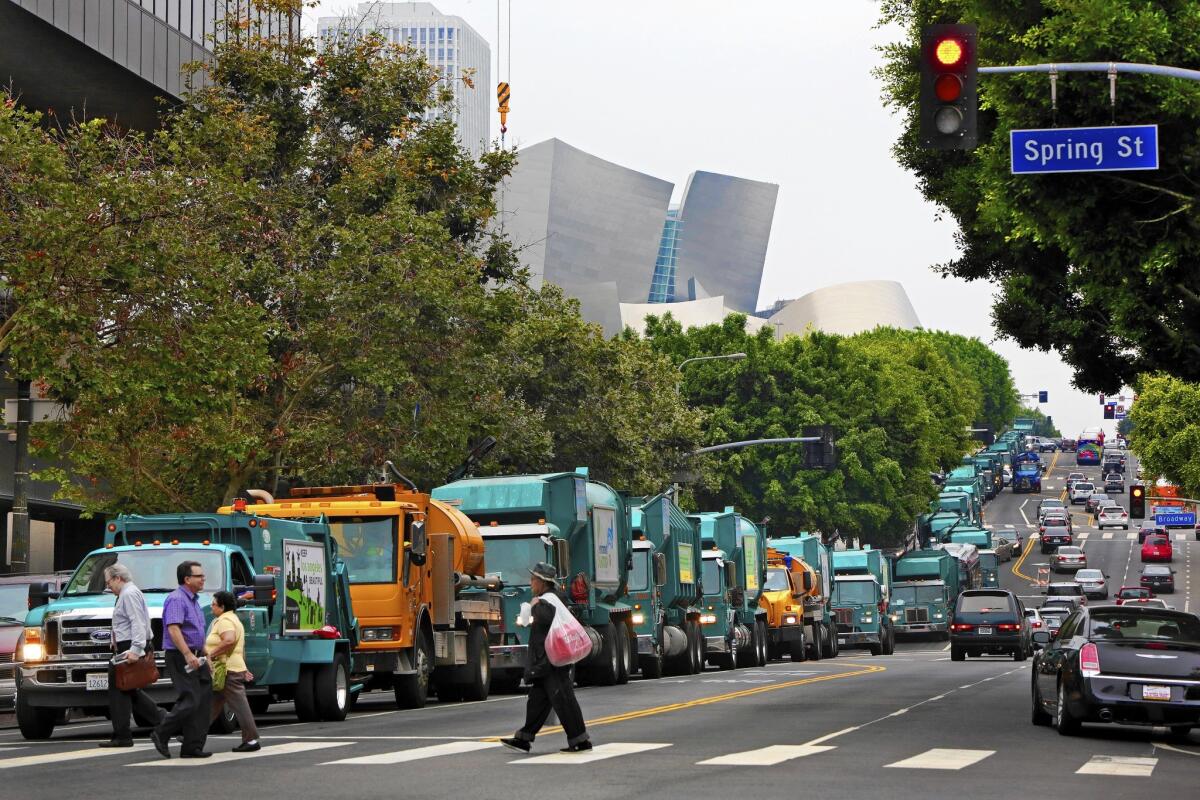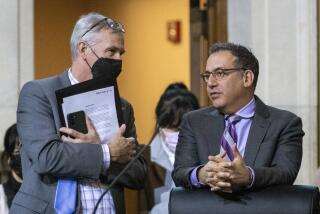City workers protest deals between L.A., Wall Street banks

Hundreds of city workers and their allies packed the streets and sidewalks outside Los Angeles City Hall on Tuesday morning, protesting what they say are predatory deals between the city and Wall Street banks.
The Fix LA coalition, which includes labor unions, clergy and community groups, argued that the city should renegotiate two bond deals signed with banks to reduce costs and use the savings to help restore funding for city services. After a morning rally outside a downtown bank, dozens of city trash trucks slowly ringed City Hall, blaring their horns, as workers clanked cowbells.
Tuesday’s protests came as labor contracts for tens of thousands of city workers expired. Negotiations for new contracts are underway, with city budget officials warning of continued financial woes and recommending no pay increases. Labor leaders say that, in addition to restoring services, their goals include ensuring that city workers and those paid by city contractors earn at least $15 an hour.
“Our community has been devastated by austerity,” said Marvel Hunter, a city tire repairman who is on a union bargaining team. Money recovered from the bond deals “can be used to repair our streets and clean up our neighborhoods.”
The protests stem in part from financial agreements the city made before the economic crash. Eight years ago, the city entered into an interest-rate swap deal with Bank of New York Mellon and Dexia for a wastewater system bond issued in 1988.
The rate swap was designed to take advantage of what were historically low interest rates. But rates subsequently dropped even lower when the economy crashed. That left the city paying more than the market rate, while the banks paid rates kept low by the Federal Reserve.
A City Council committee moved Monday to get out of the contracts. Workers and labor representatives took aim at the deals during public testimony at Tuesday’s City Council meeting, presenting a petition seeking a public inquiry into bank deals and fees.
“I don’t think it’s right that we’re giving away $300 million to Wall Street while I don’t have a children’s librarian for seven months,” said Henry Gambill, vice president of the Librarians’ Guild, to a roar of applause in the council chamber. The coalition estimates that the city spends more than $300 million on bank fees annually.
However, city finance officials have reported the bond deals are saving some money, if not as much as the city had expected. The swap has saved $21.7 million so far compared with what the city would have paid under previous agreements, and will save an additional $22.9 million by 2028, they said.
Terminating the deals would cost the city more than $25 million in fees, which “doesn’t make financial sense,” the city’s chief of debt management, Natalie Brill, said Monday. In addition, City Administrative Officer Miguel Santana said Tuesday that any swap funds could be used only on “wastewater programs.”
The protesters also took aim at the city for failing to collect penalties from owners of foreclosed homes who violate city codes on upkeep. They also contend that the city could “close property tax loopholes” to recoup revenue.
Labor unions are drawing attention to potentially untapped sources of money as the city looks to them for concessions. The budget approved by Mayor Eric Garcetti and the City Council for this budget year assumed that workers would get no salary increases and that civilian employees would pay 10% of the cost of their healthcare premiums. Workers in the coalition now can choose health plans in which they pay nothing toward the premium cost.
The Coalition of LA City Unions, which includes unions representing tree trimmers, trash truck drivers, librarians and other civilian employees, has been skeptical that such concessions are needed. It argues that savings targets already have been met through “tough bargaining” with healthcare providers to obtain lower rates, as well as the removal of hundreds of dependents, such as former spouses, who were no longer eligible for medical benefits.
Meanwhile, Bureau of Sanitation Director Enrique Zaldivar said that using city trucks at Tuesday’s protest was not allowed and that “drivers were told to return to their routes.” The Coalition of LA City Unions responded with a statement saying that sanitation workers had taken care to ensure that everyone’s trash was picked up Tuesday.
soumya.karlamangla@latimes.com
More to Read
Sign up for Essential California
The most important California stories and recommendations in your inbox every morning.
You may occasionally receive promotional content from the Los Angeles Times.











